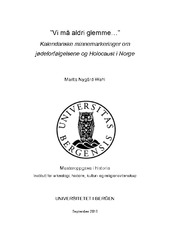| dc.description.abstract | This thesis analyses how the Holocaust, and the persecution of the Jews, has become an integral part of the collective memory in post-war Norway. Focusing on three major cities, namely Oslo, Bergen, and Trondheim, the present thesis explores the establishment of commemorative practices and memorial days commemorating the Jewish suffering before and during the Second World War. Three dates are significant in the Norwegian context: January 27th (Holocaust Remembrance Day), November 9th (“Crystal Night”, anti-Jewish pogroms in 1938) and November 26th (the first mass deportation of Norwegian Jews in 1942), although it should be noted that local variations apply. As such, the thesis has explored a subject that, until now, has remained outside the realm of research. With the exception of religious rites within the Jewish communities, public commemorations in memory of the Holocaust and the persecution of the Jews have been initiated during the last 20-30 years. As such, the commemorations originated during a period when the number of survivors from the Holocaust was rapidly decreasing, and thus the need to institutionalize the memory of the past for the future was, and still is, eminent. It is noticeably that, with a few exceptions, all of the commemorations analyzed in this thesis are morally justified by their effort to “build a better future” by drawing on historical lessons from the Holocaust. Although the Norwegian political landscape reveals a broad consensus regarding this moral superstructure – where racism, discrimination, and hate speech are presented as parallels between contemporary society and the Holocaust – some commemorations, like the “Crystal Night”, have resulted in controversy. This has been a result of different political views regarding the conflict between Israel and Palestine, where arguments from both sides of the debate have drawn on historical parallels to the Holocaust. The present thesis argues that the commemoration of the Holocaust and the persecution of the Jews can be seen as an example of the universalization of collective memory. Although only marginally affected by the Holocaust, the Norwegian population has come to integrate this historical event as part of its collective past, and uses the knowledge about this past as a moral responsibility with the hope to build a future, where the possibility of another Holocaust has been eliminated. | en_US |
